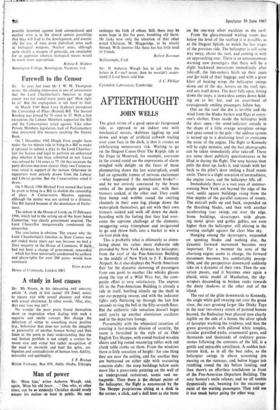Farewell to the Censor
Sir: In your last issue Mr J. W. M. Thompson writes 'the abiding impression is one of amazement that the Lord Chamberlain's function as stage censor was not ended many years ago.' How right he is! But the explapation is not hard to find.
In March 1949 Benn Levy (Labour) introduced the Censorship of Plays (Repeal) Bill. The Second Reading was passed by 76 votes to 37. With a few exceptions the Labour Members supported the Bill and the Conservatives voted against. Like other Private Members legislation, lack of Parliamentary time prevented this measure reaching the Statute Book.
On 5 December 1962 Dingle Foot sought leave under the ten minute rule to bring in a Bill to make it optional to submit a play to the Lord Chamber- lain for licence and legal to perforin an unlicensed play whether it has been submitted or not. Leave was refused by 134 votes to 77. On this occasion the party division was even clearer. Only two Conserva- tives voted in support of the motion. Otherwise its supporters were entirely drawn from the Labour and Liberal parties. But the Conservatives voted it down.
On 8 March 1966 Michael Foot moved that leave be given to bring in a Bill to abolish the censorship of plays. A Conservative Member opposed, although the matter was not carried to a division. The Bill lapsed because of the dissolution of Parlia- ment.
The debate in the House-of Lords on 17 February 1966, which led to the setting up of the Joint Select Committee, was clearly government inspired. The Lord Chancellor unequivocally condemned the censorship.
The conclusion is obvious. The reason why the Lord Chamberlain's function as State Censor was not ended Many years ago was because we had a Tory majority in the House of Commons. If there had not been a change of government, censorship —which has been universally condemned by authors and playwrights for over 200 years—would have continued.










































 Previous page
Previous page